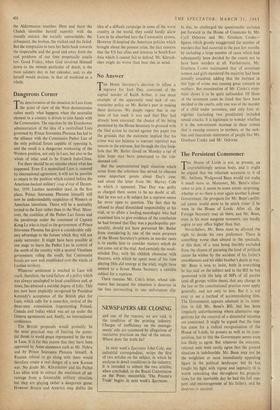Dangerous Corner
THE deterioration of the situation in Laos froni the point of view of the West demonstrates rather neatly what happens when the neutralist clement in a country is driven to join hands with the Communists. The rejection by the Eisenhower administration of the idea of a neutralised Laos governed by Prince Souvanna Phouma has led to the alliance with the Communist Pathet Lao of the only political forces capable of opposing it, and the result is a dangerous weakening of the Western position, not only in Laos, but also in the whole of what used to be French Indo-China.
For there should be no mistake about what has happened. Even if a neutralised Laos is restored by international agreement, it will not be possible to return to the position which existed before the American-backed military coup d'etat of Decem- ber, 1959. Laotian neutralists (and, in the first place, Prince Souvanna Phouma himself) will now be understandably suspicious of Western or American intentions. Theirs will be a neutrality turned to the Eat rather than to the West. More- over, the coalition of the Pathet Lao forces and the paratroops under the command of Captain Kong Le who is loyal to the government of Prince Souvanna Phouma has given a considerable mili- tary advantage to the former which they will not easily surrender. It might have been possible at one stage to leave the Pathet Lao in control of the north of the country with a neutral Vientiane government ruling the south, but Communist forces are now well established over the whole of Laotian territory.
Whatever settlement is reached in Laos will mark, therefore, the total failure of a policy which was always unadapted to local conditions and, at times, has attained a suicidal degree of folly. This has now been implicitly recognised by President Kennedy's acceptance of the British plan for Laos, which calls for a cease-fire, revival of the three-man commission (representing Poland, Canada and India) which was set up under the Geneva agreements and, finally, an international conference.
The British proposals would probably be the most practical way of limiting the poten- tial threat to world peace represented by the war in Laos. It is for this reason that they have been approved by Asian statesmen such as Mr. Nehru and by Prince Souvanna Phouma himself. A Russian refusal to go along with them would therefore create a real danger of a new Korean war. No doubt Mr. Khrushchev and his Pathet Lao allies wish to extract the maximum of ad- vantage from a favourable military situation, but they are playing rather a dangerous game. However Britain and America may dislike the idea of a difficult campaign in some of the worst country in the world, they could hardly allow Laos to be absorbed into the Communist system. However ill-inspired the American policies which brought about the present crisis, the fact remains that the US has allies and interests in South-East Asia which it cannot fail to defend. Mr. Khrush- chev might do worse than bear this in mind.


































 Previous page
Previous page